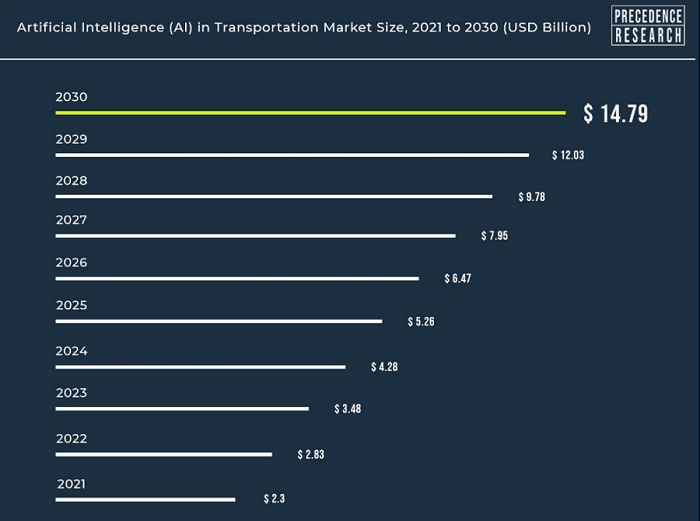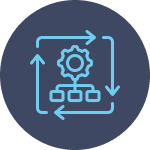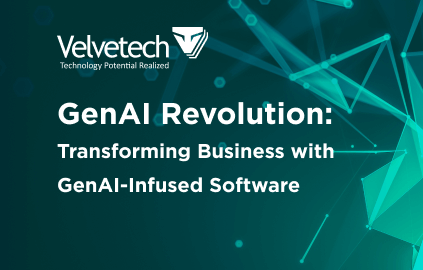The transportation and logistics industry is evolving at a rapid pace. Companies eagerly leverage new technologies to boost their operations and stand out from competitors. One of the innovations business leaders are embracing is artificial intelligence (AI).So much so that the future looks promising, with the global AI in transportation market size set to maintain the expansion trend and reach $14.79 billion by 2030.

What’s driving this popularity? In short, there are a lot of areas that AI can improve. Hence, organizations are increasingly looking at transportation software development services for help with incorporating this technology into their infrastructure.
So, that’s what will be the focus of today’s article. We’ll discuss the frequent challenges companies face and go over the top AI in transportation use cases that can help solve them.
Let’s get right into it.
GenAI for Business
Watch our webinar to uncover how to integrate GenAI for improved productivity and decisions.
Frequent Challenges Transportation Companies Face
The supply chain has faced the “perfect storm” with COVID-19 starting an enormous crisis while the subsequent labor shortages and geopolitical issues exacerbated the problem. Hence, transportation organizations are facing a myriad of inefficiencies and challenges.
For example, many are struggling to:
- Maintain vehicles and other machinery
- Predict traffic disruptions or weather conditions
- Deal with a lot of paperwork
- Anticipate demand changes
- Integrate legacy systems with modern solutions
- Collect and work with high quality data
Take a look at how we helped Migrate a Legacy System
The good news is — artificial intelligence can help with the majority of these difficulties. As long as its implementation is approached with care, advantages of AI in transportation far outweigh the required effort.
Top Use Cases of Artificial Intelligence in Transportation
There are many ways to apply artificial intelligence in the transportation industry. However, we’re going to focus on the seven main uses that are particularly relevant for logistics companies that are looking to boost efficiencies and performance.
Route Optimization

As we said, traffic disruptions can cause major delays in the transportation sector and cost organizations thousands of dollars. Of course most companies perform route planning activities, but traditional approaches often don’t consider real-time condition changes. Thus, leading to a higher frequency of mistakes.
Here, AI can help by analyzing a multitude of variables affecting routes in real-time. For instance, algorithms will take into account historical and current traffic levels, weather conditions, construction work, and the like when suggesting optimal routes.
Plus, as soon as a situation changes — the system will assess whether sticking to the existing route is best or if there is a better alternative. As you can imagine, these kinds of data analytics and recommendations can have a tremendous impact on your efforts to save time and money.
Discover the 6 Types of Data Analysis for Business
Vehicle Maintenance

As a transportation and logistics provider, you likely have a lot of vehicles to take care of and maintain. After all, they are imperative for your business to function. So, chances are, you are always looking for ways to ensure all of your trucks are in top-notch condition to avoid downtime. One of the most efficient ways to do that is with the aid of AI and the Internet of Things.
By installing smart sensors on your vehicles and even other machinery you may have in warehouses, for example, you can gather real-time information on the state that they are in.
Read about Velvetech’s Smart Tires Development Project
Then, an AI and machine learning-powered platform can analyze all of the acquired information, compare it against data on previous machine failures, and alert you whenever an issue might be just around the corner. That way, you can carry out maintenance work before the problem exacerbates itself.
Generally, IoT in transportation is a powerful tool that often goes hand-in-hand with AI. So, make sure to look into both technologies when thinking about optimal ways to boost your operational efficiency.
Intelligent Warehouse Management

In terms of warehouse management, there is a lot that AI technology can do for a transportation company. As a business leader, you’re interested in maximizing efficiency, and as such, it is important to always accurately allocate inventory space, seamlessly locate certain packages, and so on.
Artificial intelligence, coupled with computer vision and Big Data, can speed up and improve all of these processes for your transportation and logistics firm. Specifically, by automatically identifying the best storage spot for each package, suggesting how to organize stock for smoother logistics, and even monitor parcels to control quality.
Read about our Warehouse Management Software Development Project
Moreover, the popularity of warehousing robots is growing immensely in the last couple of years, especially following the labor shortages during the pandemic. This trend is bound to continue as AI-powered robots can help staff pick, sort, transport, and store items in a more efficient manner. Thus, reflecting positively on your bottom line.
“In 2020, the warehouse robotics market was worth some 5.3 billion U.S. dollars worldwide. By 2030, this market is expected to reach just under 15 billion U.S. dollars.”
— Statista
Staff Scheduling

Another great way to use artificial intelligence in transportation is for staff scheduling. You see, schedules can be one of the toughest areas to optimize for transportation and logistics business owners because there are so many factors at play.
You’ve got to think about the different types of employees you need at any given point in time, their varying preferences, sickness and vacation days, and so on. Plus, it’s important to always deploy enough staff to meet variations in demand. As such, workforce planning can be very challenging and time-consuming. With AI, it doesn’t have to be.
By analyzing myriads of information in real-time and considering all relevant factors, an AI-powered system can generate schedules that are fair, lead to better productivity, and minimize any disruptions. All because AI algorithms can analyze information and follow predefined rules in a much more efficient way than a human could.
Dynamic Pricing

In the post-pandemic reality, the cost of shipping goods is constantly changing, making it difficult for transportation firms to maintain consistent and profitable pricing strategies. This kind of uncertainty and ambiguity has encouraged many companies to look into AI-enabled dynamic pricing.
This approach requires in-depth data processing so that the optimal price can be determined. Typically, AI algorithms will take into account the predicted future shipping costs, competitor prices, and changes in supply and demand. After analyzing these factors, the system can adjust shipping rates in real-time, resulting in fairer pricing that still keeps you profitable and chosen over competitors.
Back Office Task Automation

Just like organizations across other business sectors, transportation companies have plenty of back-office tasks to take care of. Bill of lading forms, commercial invoices, dock receipts, certificates of origin, and so many other pieces of paperwork have to be processed and maintained. As you know, this can take up a large part of your employees’ working day.
Here, AI can come into play once again. The technology can help with document processing by automating data input jobs and error spotting. Thus, freeing up the time of your staff who would have had to spend hours performing this kind of repetitive work before.
Discover how Velvetech helped an executive search firm Automate Data Processing
Besides task automation, AI in transportation and logistics can also help deliver thorough business intelligence in the form of interactive dashboards and detailed reports. By carrying out analytics and generating reports in a speedy manner, intelligent algorithms can empower your company with actionable insights that lead to more informed decision-making.
Sales and Marketing

Finally, we couldn’t finish this post without mentioning the role of AI in transportation sales and marketing initiatives.
Learn more about the Role of AI in Sales
Similarly, AI can help with marketing campaigns by analyzing customer behavior and helping you segment the audience more accurately. Thus, customizing campaigns in a way that leads to more engagement and ultimately sales.
Lastly, if you have a contact center and your customer service reps are struggling with productivity, artificial intelligence can once again come to the rescue. By implementing an AI-based contact center, you can acquire real-time and post-call analytics, dynamic call scripts, and recommendations on objections handling. All these features can take your customer support team to a new level of efficiency and as such should definitely not be overlooked.
Read about an Intelligent Call Analytics Implementation Project
AI-Based Contact Center Right in Your CRM
Full-featured Inbound & Outbound call center with AI-based agent scoring and call analytics.
Begin Your AI Implementation Journey
As you can see, there are a variety of AI uses in transportation that are worth considering. The technology can help your company with warehouse management, route optimization, staff scheduling, and so much more.
So, if you’d like to discuss AI software implementation — don’t hesitate to reach out to our team. We have successfully delivered a multitude of projects for transportation and logistics providers and would be happy to jump on board your next initiative and contribute our expertise.
Simply fill out the form below and our specialists will get back to you shortly.











